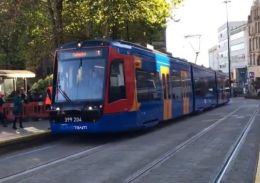Posted 25th October 2018 | 2 Comments
Delayed tram-trains start running in Yorkshire

THE first tram-trains have started running in British public service today, after the project had been delayed by several years.
The route now being served connects the tramways in central Sheffield with Rotherham via a connection with National Rail infrastructure at Tinsley.
The project has been seen as a trial to test the likelihood of similar services runnning in other cities, such as Manchester.
The original tram-train plans were announced by the Department for Transport in March 2008 for the Penistone Line between Huddersfield, Barnsley and Sheffield. In theory, services should have started in 2010.
The present route was selected for development in 2009, but the scheme was plagued by rising costs which have increased five-fold to £75 million.
Network Rail route managing director Rob McIntosh said the new services, which run every 20 minutes between Rotherham and Sheffield city centre, would stimulate the economy.
He added: ‘I foresee this network not just carrying on but also growing.’ He said further opportunities for extending the service would be explored.
Reader Comments:
Views expressed in submitted comments are that of the author, and not necessarily shared by Railnews.

Chris Jones-Bridger, Buckley Flintshire
I'm sure when originally proposed the sponsors never envisaged that it would take so long for this trial scheme to become operational. With luck it will be the first of many similar operations.
However if the concept is to gain more widespred use perhaps some questions require detailed answers especially where the five fold increase in spending was incurred. How much was actually spent on construction & procurement as opposed to development costs to make tramtrain work in the UK market? As tramtrain was already operational on several continental systems was the technology transferable or did the UK trial have to be created from first principles?
Trams & trains may have differing technical specifications but within the UK Metrolink, Croydon and Tyne & Wear all have historic experience of adapting heavy rail to light rail & in the case of the latter experience of sharing infrastructure with heavy rail. Hopefully Sheffield was able to draw from this historic experience.
Now that technical standards & operational rules have been established the challenge now is to see where an economic case can be made for adapting existing networks either as a substitute for heavy rail or as an economical means of expanding current light rail.
Andrew Gwilt, Benfleet Essex
[Message deleted by moderator. Reason: defamatory content.]